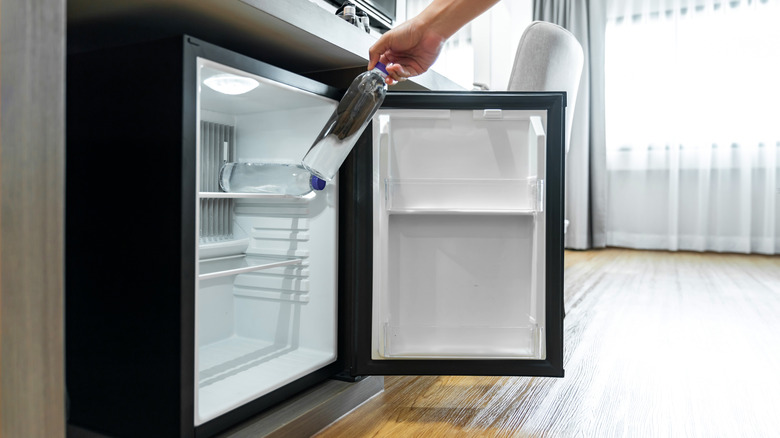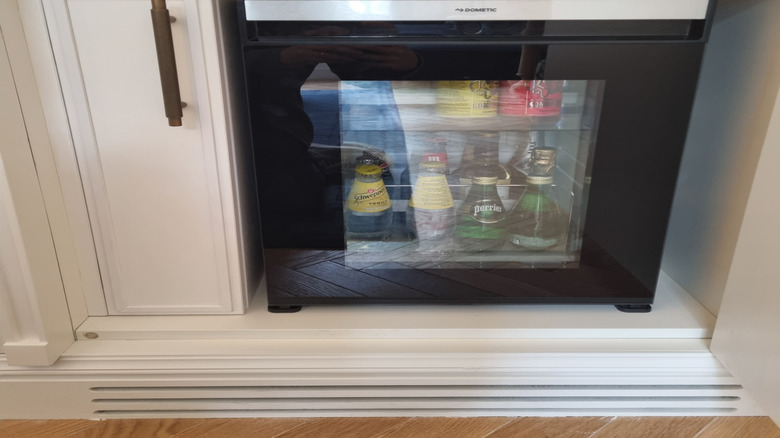Why Your Under-Counter Beverage Fridge Is So Loud And What To Do About It
Whether you're a sommelier at heart or simply love a good drink, an under-counter beverage fridge is a must-have appliance that will add a touch of luxury to your kitchen. A compact beverage cooler allows you to store all of your favorite sips in one place, reducing clutter in your main refrigerator. Even Martha Stewart loves an under-counter refrigerator in the kitchen for the extra storage potential. While it can be incredibly convenient and space-saving, an under-counter beverage fridge may come with some unexpected drawbacks. For example, you may notice that it is louder than your other appliances.
The truth about beverage fridges is that they are somewhat noisy to begin with. Their smaller size, powerful temperature cooling system, high-speed compressor, ventilation fans, and energy-saving features are all contributing factors. Wine fridges with glass doors contain less noise insulation than traditional refrigerators, making the sound even more noticeable. If you're shopping for an under-counter fridge, look for units that produce a sound below 40 decibels (dB). Anything louder may be too noisy for common areas like the kitchen.
If the noise coming from your fridge seems excessive, there are several possible reasons. Some of these are easy to fix with the tightening of a few screws or some light maintenance; the internal components may just be dusty or loose. The most common culprits are the fan and the compressor, both of which are usually located behind a rear panel near the bottom of the fridge. However, some fridge noises require professional help — such as loud grinding, scraping, knocking, or rattling sounds, any of which may indicate that a component needs to be replaced.
Identifying an issue with your fridge's fan
If your under-counter fridge has suddenly become louder, there's likely an underlying issue to be fixed. Start by paying attention to the type of sound you hear. For example, if it's a rattling sound coming from the mechanical part of the fridge, the source may be the fan. It might have loose screws interfering with the fan blades, which would amplify the noise level. The blades may also accumulate dust and debris over time, causing obstructions that disrupt the airflow and make the fan run louder to compensate.
To check for issues with the fan, first unplug the fridge, remove the rear panel, and locate the component. Check that it's installed tightly; if it's loose, you may be able to tighten the screws holding it in place. If it's dusty, use a soft brush or the handheld attachment of your vacuum cleaner to remove debris, then wipe it clean with a damp microfiber cloth and mild soap. Ensure that the component is fully dry before plugging the fridge back in. The condenser coils are also susceptible to dust buildup that may cause unnecessary noise over time. Regularly cleaning these essential components will help keep sound levels to a minimum and preserve the lifespan of your fridge.
Other common causes of a noisy beverage fridge
If your fridge is a few years old, the noise may simply be a sign of wear and tear. An abnormally loud humming or buzzing sound may be an indicator that the compressor is malfunctioning and in need of replacement. If the sound is more like banging or rattling, the compressor may have come loose, which could be fixed by simply tightening the screws holding it in place. Always consult the owner's manual before disassembling your fridge, and bring in a professional if you aren't sure what to look for. If noises persist or worsen after cleaning and tightening essential components, it's probably time to call for service.
Before going that route, though, check to ensure that the cause of the noise isn't due to a simpler issue. For example, it may be standing on an uneven surface or leaning against a cabinet, which would cause vibrations or rattling noises as it runs. Simply adjusting the fridge's leveling or moving it slightly away from nearby surfaces could solve the problem. Your fridge may also be either too empty or too full, causing the cooling system to work harder to keep the interior airflow and contents at a consistent temperature. Tweaking the fridge's temperature settings could make its job easier and keep noise levels down.


